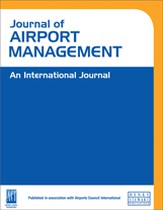Can airports be a catalyst for reducing aviation’s effect on the climate?
Abstract
The aviation ecosystem is increasingly coming under pressure to decarbonise from the public and governments. Airports are at the leading edge of transforming their operations, alongside airlines and aerospace companies. While, however, the levers to reduce Scope 1 and 2 airport emissions are well understood, how to address Scope 3 emissions (which account for the bulk of an airport’s emissions) remains a major challenge. This paper provides an overview of potential Scope 3 decarbonisation levers across aircraft operations, ground transport and infrastructure construction. The paper then assesses the potential impact on emissions, and ease of implementation of these levers, highlighting aircraft operations as the area with highest potential to reduce ecosystem emissions. Next, the paper looks at how some of these levers have been implemented in practice, based on the case study of Geneva Airport, focusing on supporting sustainable mobility, energy support for aircraft and financial incentives for airlines to use latest-generation aircraft. The paper then identifies and discusses key barriers that must be overcome, including the ability of airports to influence domains outside their direct control, competing governmental policies and need for investment, highlighting the need for collaboration between a wide range of stakeholders. Based on this, the paper suggests a number of actions that airports should take to satisfy stakeholders and catalyse the aviation ecosystem towards its goal of achieving net zero.
The full article is available to subscribers to the journal.
Author's Biography
André Schneider joined Geneva Airport as Chief Executive Officer in September 2016. Before this, he has been Vice President, Resources and Infrastructures at the École Polytechnique Fédéral de Lausanne, Managing Director and Chief Operating Officer of the World Economic Forum and has been building and leading an information technology consulting team for IBM. He has a PhD in computer science from the University of Geneva. Before this, André studied and played as a classical orchestra musician in several German and Swiss symphony orchestras.
Christopher Stern is a Project Manager in Roland Berger’s London office. Christopher works primarily on sustainability topics, with a particular focus on the aviation ecosystem and how it can decarbonise. As part of this, he has worked closely with a range of airlines, airports, manufacturers and funding bodies. Christopher holds a Master’s in chemistry from the University of Oxford.
Nikhil Sachdeva is Roland Berger’s Global Lead for Aerospace and Aviation Sustainability and a Principal in the London office. Nikhil leads Roland Berger’s work into how the aviation sector can transition to more climate-friendly technologies, from sustainable aviation fuels (SAF) to hydrogen to electrical propulsion, as well as the commercial and technological implications for the aerospace, aviation and fuels sectors. He specialises in strategy and implementation projects, having worked with major airlines, aerospace original equipment manufacturers (OEMs), investors, suppliers as well as governmental bodies. Nikhil holds a Master’s in engineering from Imperial College and an MBA from the Harvard Business School.
Marc Mounier trained as a lawyer and worked as an associate at the law company Schellenberg Wittmer. He joined Geneva Airport in 2001, where he managed Environment and Legal Affairs until 2018, and then the Environment and Sustainable Development department until 2022. Today, Marc is in charge of regulatory projects relating to the operations and the development of Geneva Airport.
